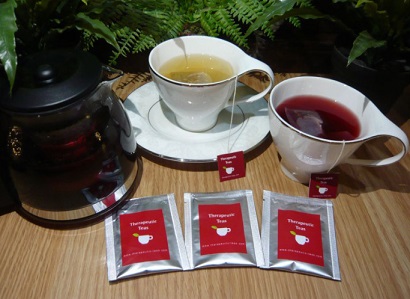University Of Georgia Study Shows That Drinking Hot Black, Green Or Herbal Teas Help Reduce SARS-CoV-2 Viral Loads In The Oral Cavity
Nikhil Prasad Fact checked by:Thailand Medical News Team Apr 09, 2024 11 months, 3 weeks, 3 days, 5 hours, 7 minutes ago
COVID-19 News: The tradition of tea spans centuries and cultures, often revered for its medicinal properties and soothing effects. In recent times, amidst the global COVID-19 pandemic, researchers have turned their attention to this age-old beverage, investigating its potential in combating the novel coronavirus. The University of Georgia's study stands out as a significant contribution to this evolving field, offering insights into how certain teas can reduce SARS-CoV-2 viral loads in the oral cavity.
 Drinking Hot Black, Green Or Herbal Teas Help Reduce SARS-CoV-2 Viral Loads In The Oral Cavity
Tea's Journey in Medical Science
Drinking Hot Black, Green Or Herbal Teas Help Reduce SARS-CoV-2 Viral Loads In The Oral Cavity
Tea's Journey in Medical Science
Tea's medicinal use dates back to ancient times, where it was often prescribed for respiratory ailments, among other health benefits. Today, modern science has delved into the bioactive compounds within tea, such as polyphenols, catechins, and flavonoids, unravelling their potential in bolstering immune function and combating pathogens.
The Urgency of COVID-19 Research
The emergence of the COVID-19 pandemic in 2019 sparked a global race to understand the virus, develop vaccines, and identify effective preventive measures. Amidst this urgency, researchers like Dr Malak Esseili at the University of Georgia focused on accessible and potentially impactful interventions, leading to the investigation of tea's antiviral properties.
Methodology: Screening Tea Varieties for Antiviral Efficacy
The study meticulously screened 24 commercially available teas, assessing their ability to inactivate infectious SARS-CoV-2 in simulated conditions. The teas were prepared as infusions and incubated with the virus, with subsequent analysis focusing on reductions in viral infectivity.
Key Findings: Tea's Effectiveness Against SARS-CoV-2
Among the teas tested, black tea emerged as particularly effective, showcasing a remarkable 99.9% reduction in viral load within a mere 10 seconds of contact. Other variants, including green tea, mint medley, eucalyptus-mint, and raspberry zinger, also exhibited significant reductions ranging from 96% to 99%.
Exploring Tea's Mechanisms of Action
The study delved into the underlying mechanisms through which tea exerts its antiviral effects. Tea polyphenols, renowned for their antioxidant and antimicrobial properties, were identified as key players in the rapid inactivation of SARS-CoV-2. This correlation between polyphenol content and virus reduction sheds light on tea's potential as a natural intervention.
Practical Applications: Drinking and Gargling with Tea
One of the study's practical aspects was the evaluation of tea's efficacy both as a drink and as a gargle. Researchers found that concentrated tea infusions, whether consumed or used as a gargle, could significantly reduce SARS-CoV-2 viral loads in the oral cavity, offering a simple yet potentially impactful preventive measure.
Tea as a Complementary Intervention&l
t;/strong>
While emphasizing that tea should not replace medical care, the study highlights its potential as a complementary intervention. Tea's accessibility, safety, and historical use make it an attractive option for individuals seeking additional ways to protect themselves against COVID-19.
Dr Esseili commented, "Inactivating SARS-CoV-2 in the mouth and the throat matters because that potentially reduces the introduction of the virus to the lower respiratory system.”
TMN had covered numerous COVID-19 News articles extolling the merits of various Teas for COVID-19 since the early part of the pandemic.
https://www.thailandmedical.news/news/breaking-covid-19-news-japanese-study-validates-that-catechins-and-its-derivatives-from-green-and-black-teas-inactivate-omicron-subvariants
https://www.thailandmedical.news/news/japanese-study-shows-that-while-black-tea-has-antiviral-and-therapeutic-effects-against-sars-cov-2-infections,-adding-milk-destroys-its-antiviral-effe
https://www.thailandmedical.news/news/covid-19-herbs-scientist-study-phytochemicals-found-in-green-tea-such-as-theaflavins-,-catechins-and-myricetins-as-potential-antivirals-against-sars-c
https://www.thailandmedical.news/news/covid-19-therapeutics-computational-screenings-show-a-variety-of-natural-phytochemicals-could-have-efficacy-against-sars-cov-2-including-egcg-from-gre
https://www.thailandmedical.news/news/covid-19-herbs-german-study-shows-green-tea,-chokeberry-and-pomegranate-juices-inhibit-sars-cov-2-in-vitro,-but-beware-of-vitro-studies
Thailand Medical News had even created our own range of herbal teas and therapeutic teas that have since been reformulated many times due to the emergence of various new SARS-CoV-2 sub-lineages and we have even created a number of lines that can be used as adjuvants to deal with neuroinflammation, cardiac issues, lung fibrosis, strokes, gastrointestinal issues, glaucoma and for various Long COVID-19 issues.
https://www.thailandmedical.news/news/new-therapeutic-teas-
Future Directions: Clinical Trials and Further Research
Looking ahead, the researchers advocate for clinical trials to validate these findings in real-world settings. Such trials could provide valuable data on tea's effects on COVID-19 patients, including its potential to reduce viral transmission and mitigate disease severity.
Tea's Role in Public Health Messaging
The University of Georgia study's findings also have implications for public health messaging. Integrating tea as part of preventive strategies could empower individuals to take proactive steps in safeguarding their health, especially in the face of evolving viral threats.
Conclusion: Harnessing Tea's Potential for Public Health
In conclusion, the University of Georgia's research underscores tea's potential as a natural intervention against COVID-19. From black tea's potent antiviral properties to the broader spectrum of teas showing promising results, this study opens avenues for further exploration and integration of tea into public health initiatives.
Key Takeaways:
-Tea, with its rich historical legacy and modern scientific validation, holds promise in reducing SARS-CoV-2 viral loads.
-Black tea and other variants exhibit significant antiviral effects, attributed in part to their polyphenol content.
-Practical applications such as drinking tea or using it as a gargle offer accessible and potentially impactful preventive measures.
-Clinical trials are needed to validate these findings and explore tea's role in mitigating COVID-19 transmission and severity.
-Tea's integration into public health messaging could empower individuals to adopt proactive measures in combating infectious diseases.
The study findings were published in the peer reviewed journal: Food and Environmental Virology.
https://link.springer.com/article/10.1007/s12560-023-09581-0
For the latest COVID-19 News, keep on logging to Thailand Medical News.
